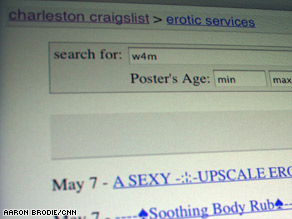
Craigslist’s managers have complied with the wishes of most of the state attorneys general who demanded they rid the site of prostitution ads.
The Web’s dominate classifieds publication replaced its controversial “erotic” section with a new “adult” category. And where Craigslist once relied on readers to flag dodgy advertisements, the company’s employees now review every ad submitted to the adult area before they appear online. Yet, the site has been unable to block every solicitation for sex. Catherine, a self-described sex worker from San Francisco, confirmed for CNET that she successfully posted an ad for her services to the adult section late last week. She wished to remain anonymous, so neither the ad’s photo nor text can be included in this story. Regardless, it isn’t hard to find questionable ads in Craigslist’s new adult section. The most noticeable difference between Craigslist’s erotic and adult categories is the photos. In the adult section, the photos are less provocative. Less skin is showing. When it comes to the text, however, the two sections are very similar. Both are packed with ads for massage services. Ads in both areas include descriptions of the masseuse’s breast size (“I’m a natural C cup”) and they are often photographed dressed in their underwear. Even if most of these services are legitimate, and only a few are veiled offers of sex in the new adult area, plenty of others make little if any pretense about what they offer. These ads typically include words such as “busty,” or “fantasy girl” in their descriptions. Often, they feature photos of a woman or man dressed provocatively in their underwear or bathing suit. Some include hourly rates. Clearly, Craigslist faces a significant challenge as it tries to purge prostitution from its Web pages. While it can ban nude photos and overt offers of sex, how can anyone expect the site to outlaw ads featuring photos of bikini-clad women offering phone numbers One can find racier images in department store ads.
Don’t Miss
Latest CNET News videos
CNET News image galleries
More technology news from CNET
The Internet has made it easier for merchants of all kinds to conduct commerce and reach wider audiences. Should anyone be surprised that the sex trade has benefited from this as well. If Craigslist were to disappear tomorrow, does anyone really expect that would curb prostitution A review of some competing online classifieds shows that while Craigslist has been a popular destination for sex workers, it is by no means the only one. For example, Backpages.com is an online classified publication and Craigslist competitor. The content it produces can also be found on the Web sites of some entertainment and alternative publications in major metropolitan areas, such as New York’s Village Voice or San Francisco’s SFWeekly. Craigslist is G-rated compared with the photos found in Backpages’ adult section. Ads included nude photos while others showed people engaged in sexual intercourse. A common ad would show a bare chested woman asking men to call her at a phone number. In the area of Backpages that services Charleston, S.C., one ad found on Tuesday by CNET featured a photo of a bare-chested woman apparently engaged in masturbation. It must be noted that there was nothing as graphic on Craigslist. This is relevant because Henry McMaster, South Carolina’s attorney general, last week threatened Craigslist with a criminal investigation. McMaster hasn’t made any similar threats–at least none that has been publicized–against Backpages. Managers at Backpages did not respond to an interview request. In November, Craigslist and 40 state attorneys general, including McMaster, signed an agreement that called for the site to add more safeguards. The classifieds publication followed through and one of the new changes was a new requirement that anyone posting to the erotic section must provide a credit card. All the parties hoped that criminals would be unwilling to provide identification and this would be deterrent. “Many of the classified and communication services on the Craigslist site provide the public with a valuable service,” McMaster wrote to Craigslist CEO Jim Buckmaster on May 5. “However, it appears that the management…has knowingly allowed the site to be used for illegal and unlawful activity after warnings from law enforcement officials and after an agreement with forty state attorneys general.” Since then, Craigslist did away with the erotic section and agreed to review every ad before it appeared, but McMaster was dissatisfied. He posted a note on his site that said the “Craigslist South Carolina site continues to display advertisements for prostitution and graphic pornographic material. This content was not removed as we requested. We have no alternative but to move forward with criminal investigation and potential prosecution.” This is at best an empty threat, says Matt Zimmerman, a senior staff attorney for the Electronic Frontier Foundation. The Communication Decency Act protects Web sites like Craigslist from being held criminally liable for the actions of its users, Zimmerman said, who added that Craigslist has no legal obligation to even review ads before they go online. Had Zimmerman had his way, Craigslist would have never agreed to do the monitoring. Craig Newmark, Craigslist’s founder, had earlier gone on national TV and said that Craigslist would not do away with the erotic section. The company’s reversal may have led McMaster to believe he could shame Craigslist managers into doing more than what the law required. “It made life more difficult for Craigslist I think,” Zimmerman said. “But I was much more disappointed with (McMaster) than Craigslist,” Zimmerman said. “His threats were bogus to begin with and he was wrong to threaten (Craigslist’s managers) with jail when the law is very clearly on their side.”